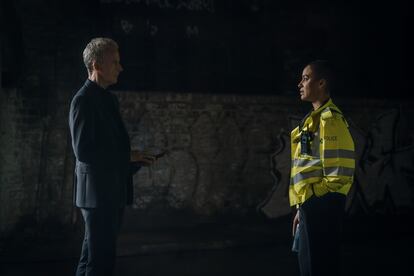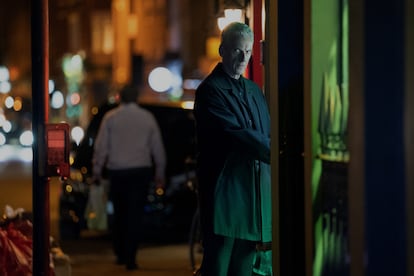‘Criminal Record’: As raw as life, as impeccable as the finest police procedural
The Apple TV+ series once again displays the best virtues of British productions: performances, script and sense of rhythm come together to create a high-quality series

The first scenes of Apple TV+ drama Criminal Record are a small lesson in storytelling. They also serve as a preview of what the viewer can expect over the following episodes. We see a close-up of Daniel Hegarty (a sinister and impeccable Peter Capaldi, who seamlessly detaches himself from his most charismatic role as Doctor Who). He’s a cop who earns extra money as a chauffeur for VIP clients. There is something shady in his look and his way of speaking, providing more information than in the flashbacks so common to the genre. In the background is a dated London at night.
The impeccable pace of this series then leads us to the phone call that triggers the case: a battered woman claims that her boyfriend has confessed to her that he committed a murder for which another man is serving a 24-year prison sentence. Fielding the call is a young and ambitious detective, June Lenker (Cush Jumbo, who fans of The Good Wife and The Good Fight will remember fondly). She pieces things together, no matter how much trouble it brings or how much Detective Chief Inspector Hegarty — who led the case that condemned an innocent man — belittles her, sets traps, and does everything possible to prevent her from uncovering his trickery and corruption. The parallel stories (the life of the son of the falsely accused man, for example, and how he tries to cope with a father in jail and in a hostile environment) are told in the right measure and acquire full meaning when integrated into the main plot.

Midway through the eight-episode miniseries, the story unfolds after the murder of a 9-year-old boy in a park. Lenker steps into the lion’s den and joins the investigation team led, precisely, by Hegarty. Here we see another side of Capaldi’s character: that of a corrupt and frightening cop, but also a man willing to do anything to catch the killers. It sends shivers down the spine, but by giving Hegarty these blurred edges, the story becomes uncomfortable and gripping for the viewer. “Despite appearances, Dan is one of the good guys,” a chief tells Lenker about the shady DCI. It is left to the viewer to make the final judgment.
That would be enough for a police procedural measured to the millimeter, which British television does so well, but Criminal Record goes much further. It is a story of women fighting to stay alive and to denounce and bring down those who are killing them. It is also a drama about male violence, so measured, so intense, so well-written and acted that it is genuinely unsettling. It is also about the power of organized crime in big cities, and the pain and incomprehension felt by the innocent caught in the crossfire.

The viewer should not expect a series that offers theses or heavy sociological analysis: the plot twists are delivered in an almost perfect puzzle, which skillfully ups the pace in the final third without derailing. Lenker is tenacious, she gets closer to the truth, but all that crime stains those who investigate it; it affects their families, their way of seeing the world, and of inhabiting reality. It fills their existence with darkness and trauma, whether they are young police officers with beautiful families or lonely and tainted individuals at the end of their careers. That is the most difficult thing to portray in crime fiction and, again, those behind Criminal Record nail it.
Sign up for our weekly newsletter to get more English-language news coverage from EL PAÍS USA Edition
Tu suscripción se está usando en otro dispositivo
¿Quieres añadir otro usuario a tu suscripción?
Si continúas leyendo en este dispositivo, no se podrá leer en el otro.
FlechaTu suscripción se está usando en otro dispositivo y solo puedes acceder a EL PAÍS desde un dispositivo a la vez.
Si quieres compartir tu cuenta, cambia tu suscripción a la modalidad Premium, así podrás añadir otro usuario. Cada uno accederá con su propia cuenta de email, lo que os permitirá personalizar vuestra experiencia en EL PAÍS.
¿Tienes una suscripción de empresa? Accede aquí para contratar más cuentas.
En el caso de no saber quién está usando tu cuenta, te recomendamos cambiar tu contraseña aquí.
Si decides continuar compartiendo tu cuenta, este mensaje se mostrará en tu dispositivo y en el de la otra persona que está usando tu cuenta de forma indefinida, afectando a tu experiencia de lectura. Puedes consultar aquí los términos y condiciones de la suscripción digital.









































